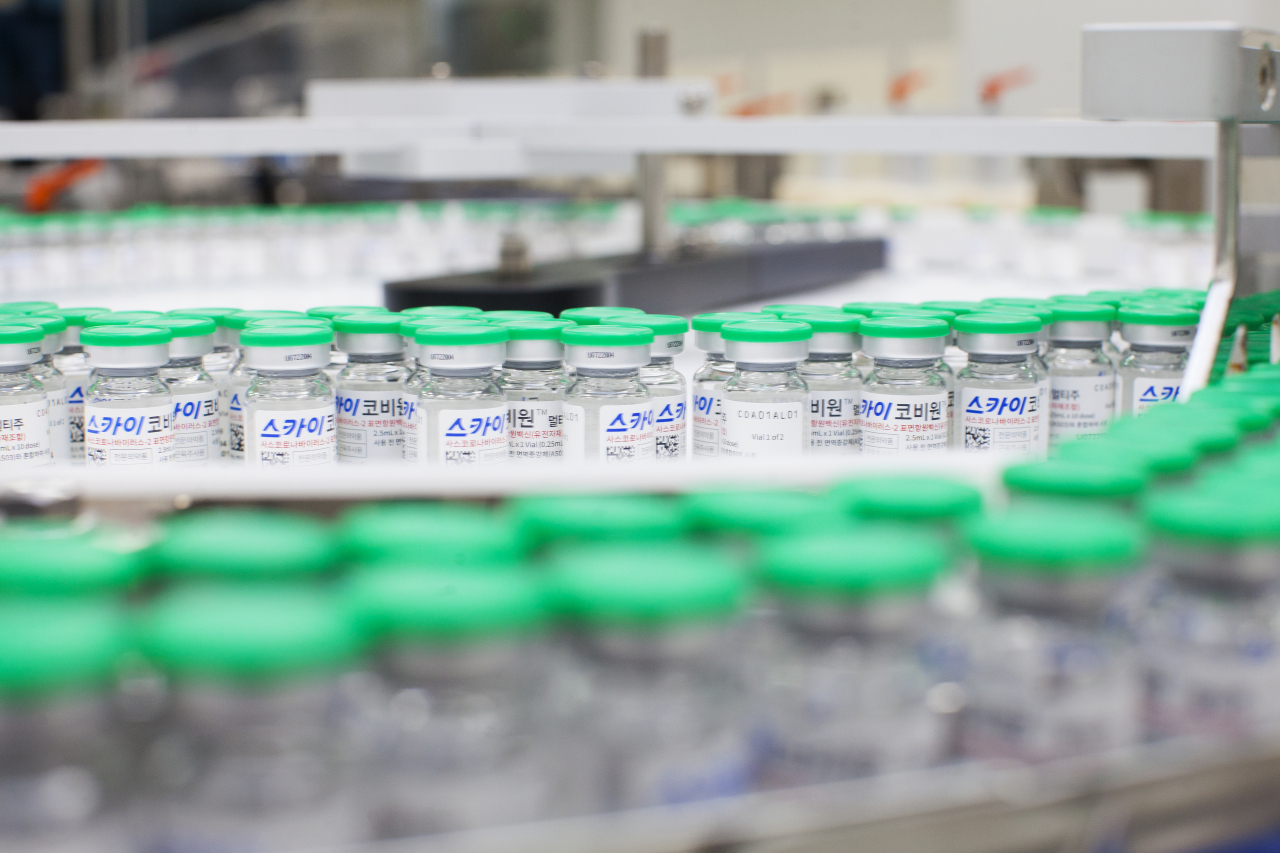August 12, 2022
SEOUL – ANDONG, North Gyeongsang Province Hundreds of vials were lined up on the belt of a packaging machine at L House, SK Bioscience’s vaccine manufacturing facility in Andong, North Gyeongsang Province, on Wednesday afternoon, as the developer of South Korea’s first homegrown COVID-19 vaccine SKYCovione is poised to roll out the vaccine’s first batch by the end of August.
A few technicians, who were covered from head to toe with sterilized gear — protective shoes, clothing and hair caps — oversaw the automatic process while others put finishing touches on the packages.
On the surface of the packaged products, which were stacked one by one in a yellow plastic box, it read: “SKYCovione Multi-Inj.”
“It takes about four months to have a final SKYCovione drug product ready to be rolled out,” said Lee Sang-gyun, general manager of Andong L House and senior vice president of SK Bioscience, referring to the entire process of cell culture, fermentation, refining and quality control of the vaccine.
“We are currently working to produce 60,000 vials as the first batch of SKYCovione, which would equal 600,000 doses. We plan to apply for a national lot release review with the Ministry of Food and Drug Safety next week,” he said.
The national lot release review is the final checkup conducted by the drug authorities before an approved drug hits the domestic market. The Drug Ministry’s national lot release review usually takes about two weeks.
Inside each package, there were 10 vials of SKYCovione, along with 10 vials of global drug maker GSK’s pandemic adjuvant. Lee explained that doctors and medical workers would mix the two when administering the vaccine.

Vials containing SK Bioscience’s COVID-19 vaccine SKYCovione (SK Bioscience)
L House is currently operating all of its nine suites to produce various vaccines. Of them, two suites are in charge of cell culture and fermentation of two different components, A and B. These components make up nanoparticles, which serve as the basis of SKYCovione, a recombinant protein vaccine.
“For the first batch of SKYCovione, the expiration period is six months, because that is the duration we secured from the safety results of the clinical trials,” Lee said.
The general manager explained that the expiration period will be longer as more safety data about the vaccine is obtained.
Lee also highlighted that the rollout of SKYCovione will pick up its pace once the company obtains the national lot release approval from drug authorities. The government inked an early purchase contract worth 200 billion won ($153 million) with SK Bioscience to buy 10 million doses of SKYCovione in March.
Though SKYCovione is ready to reach local market, some critics worry that it may draw lukewarm reaction.
“People have seen many cases of COVID-19 vaccine’s side effects over the past two years. So the level of trust in vaccines has dipped in general,” said Dr. Ma Sang-hyuk, president of South Gyeongsang Province medical association’s pandemic committee.
“Since SKYCovione has been made as a traditional recombinant protein vaccine, it has a longer track record of safety than mRNA vaccines. So it’s important for the public to know this when they consider getting a jab,” he added.
The vaccine developer also plans to target the global market as it seeks approvals from the World Health Organization and countries across the world.
According to Korea Investment and Securities’ report, this year’s SKYCovione sales are estimated at 260 billion won. The figure is expected to jump to 732 billion won for next year, given that SK Bioscience acquires product approvals from the UK and European Medicines Agency as well as WHO’s prequalification mark.

A researcher holds up the final package product of SKYCovione (SK Bioscience)


